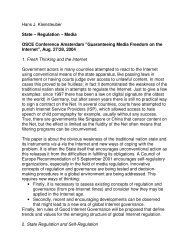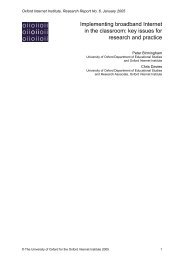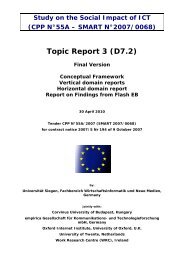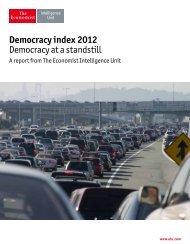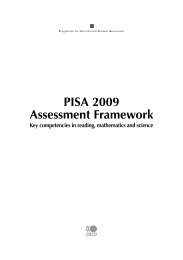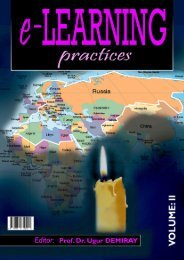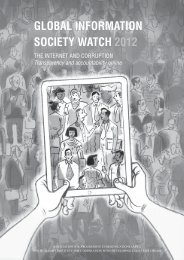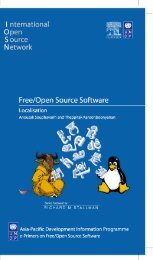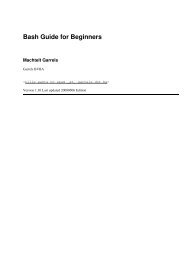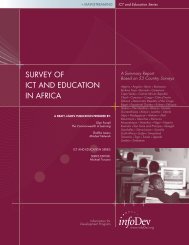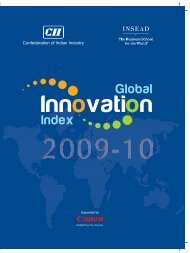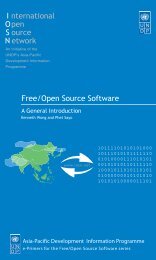- Page 1 and 2: LEGAL ASPECTS of thE InformaTION so
- Page 3 and 4: LEGAL ASPECTS of thE InformaTION so
- Page 5 and 6: Evolution of this book e FTA has re
- Page 7 and 8: Acknowledgenments e authors wish to
- Page 9 and 10: Introduction to the legal aspects o
- Page 11: GNUFDL • Introduction to the lega
- Page 14 and 15: GNUFDL • 6 Introduction to the le
- Page 16 and 17: GNUFDL • 8 Introduction to the le
- Page 18 and 19: GNUFDL • 10 Introduction to the l
- Page 20 and 21: GNUFDL • 12 Introduction to the l
- Page 22 and 23: GNUFDL • 14 Introduction to the l
- Page 24 and 25: GNUFDL • Intellectual property: a
- Page 28 and 29: GNUFDL • 6 Intellectual property:
- Page 30 and 31: GNUFDL • 8 Intellectual property:
- Page 32 and 33: GNUFDL • 10 Intellectual property
- Page 34 and 35: GNUFDL • 12 Intellectual property
- Page 36 and 37: GNUFDL • 14 Intellectual property
- Page 38 and 39: GNUFDL • 16 Intellectual property
- Page 40 and 41: GNUFDL • 18 Intellectual property
- Page 42 and 43: GNUFDL • 20 Intellectual property
- Page 44 and 45: GNUFDL • 22 Intellectual property
- Page 46 and 47: GNUFDL • 24 Intellectual property
- Page 48 and 49: GNUFDL • 26 Intellectual property
- Page 50 and 51: GNUFDL • 28 Intellectual property
- Page 52 and 53: GNUFDL • 30 Intellectual property
- Page 54 and 55: GNUFDL • 32 Intellectual property
- Page 56 and 57: GNUFDL • 34 Intellectual property
- Page 58 and 59: GNUFDL • 36 Intellectual property
- Page 60 and 61: GNUFDL • 38 Intellectual property
- Page 62 and 63: GNUFDL • 40 Intellectual property
- Page 64 and 65: GNUFDL • 42 Intellectual property
- Page 66 and 67: GNUFDL • 44 Intellectual property
- Page 68 and 69: GNUFDL • 46 Intellectual property
- Page 70 and 71: GNUFDL • 48 Intellectual property
- Page 72 and 73: GNUFDL • 50 Intellectual property
- Page 74 and 75: GNUFDL • 52 Intellectual property
- Page 76 and 77:
GNUFDL • Trademarks and patents C
- Page 78 and 79:
GNUFDL • Trademarks and patents 3
- Page 81 and 82:
GNUFDL • 7 Trademarks and patents
- Page 83 and 84:
GNUFDL • 9 Trademarks and patents
- Page 85 and 86:
GNUFDL • 11 Trademarks and patent
- Page 87 and 88:
GNUFDL • 13 Trademarks and patent
- Page 89 and 90:
GNUFDL • 15 Trademarks and patent
- Page 91 and 92:
GNUFDL • 17 Trademarks and patent
- Page 93 and 94:
GNUFDL • 19 Trademarks and patent
- Page 95 and 96:
GNUFDL • 21 Trademarks and patent
- Page 97 and 98:
GNUFDL • 23 Trademarks and patent
- Page 99 and 100:
GNUFDL • 25 Trademarks and patent
- Page 101 and 102:
GNUFDL • 27 Trademarks and patent
- Page 103 and 104:
GNUFDL • 29 Trademarks and patent
- Page 105 and 106:
GNUFDL • 31 Trademarks and patent
- Page 107 and 108:
GNUFDL • 33 Trademarks and patent
- Page 109 and 110:
GNUFDL • 35 Trademarks and patent
- Page 111 and 112:
GNUFDL • 37 Trademarks and patent
- Page 113 and 114:
GNUFDL • 39 Trademarks and patent
- Page 115 and 116:
GNUFDL • 41 Trademarks and patent
- Page 117 and 118:
GNUFDL • 43 Trademarks and patent
- Page 119 and 120:
GNUFDL • 45 Trademarks and patent
- Page 121 and 122:
GNUFDL • 47 Trademarks and patent
- Page 123:
GNUFDL • 49 Trademarks and patent
- Page 126 and 127:
GNUFDL • Software licences and fr
- Page 128 and 129:
GNUFDL • Software licences and fr
- Page 131 and 132:
GNUFDL • 7 Software licences and
- Page 133 and 134:
GNUFDL • 9 Software licences and
- Page 135 and 136:
GNUFDL • 11 Software licences and
- Page 137 and 138:
GNUFDL • 13 Software licences and
- Page 139 and 140:
GNUFDL • 15 Software licences and
- Page 141 and 142:
GNUFDL • 17 Software licences and
- Page 143 and 144:
GNUFDL • 19 Software licences and
- Page 145 and 146:
GNUFDL • 21 Software licences and
- Page 147 and 148:
GNUFDL • 23 Software licences and
- Page 149 and 150:
GNUFDL • 25 Software licences and
- Page 151 and 152:
GNUFDL • 27 Software licences and
- Page 153 and 154:
GNUFDL • 29 Software licences and
- Page 155 and 156:
GNUFDL • 31 Software licences and
- Page 157 and 158:
GNUFDL • 33 Software licences and
- Page 159 and 160:
GNUFDL • 35 Software licences and
- Page 161 and 162:
GNUFDL • 37 Software licences and
- Page 163 and 164:
GNUFDL • 39 Software licences and
- Page 165 and 166:
GNUFDL • 41 Software licences and
- Page 167 and 168:
GNUFDL • 43 Software licences and
- Page 169 and 170:
GNUFDL • 45 Software licences and
- Page 171 and 172:
GNUFDL • 47 Software licences and
- Page 173 and 174:
GNUFDL • 49 Software licences and
- Page 175 and 176:
GNUFDL • 51 Software licences and
- Page 177 and 178:
GNUFDL • 53 Software licences and
- Page 179 and 180:
GNUFDL • 55 Software licences and
- Page 181 and 182:
GNUFDL • 57 Software licences and
- Page 183 and 184:
GNUFDL • 59 Software licences and
- Page 185 and 186:
GNUFDL • 61 Software licences and
- Page 187 and 188:
GNUFDL • 63 Software licences and
- Page 189 and 190:
GNUFDL • 65 Software licences and
- Page 191 and 192:
GNUFDL • 67 Software licences and
- Page 193 and 194:
GNUFDL • 69 Software licences and
- Page 195 and 196:
GNUFDL • 71 Software licences and
- Page 197 and 198:
GNUFDL • 73 Software licences and
- Page 199 and 200:
GNUFDL • 75 Software licences and
- Page 201 and 202:
GNUFDL • 77 Software licences and
- Page 203 and 204:
GNUFDL • 79 Software licences and
- Page 205 and 206:
GNUFDL • 81 Software licences and
- Page 207 and 208:
GNUFDL • 83 Software licences and
- Page 209 and 210:
GNUFDL • 85 Software licences and
- Page 211 and 212:
GNUFDL • 87 Software licences and
- Page 213 and 214:
GNUFDL • 89 Software licences and
- Page 215 and 216:
Legal aspects of online activities
- Page 217:
GNUFDL • Legal aspects of online
- Page 220 and 221:
GNUFDL • 6 Legal aspects of onlin
- Page 222 and 223:
GNUFDL • 8 Legal aspects of onlin
- Page 224 and 225:
GNUFDL • 10 Legal aspects of onli
- Page 226 and 227:
GNUFDL • 12 Legal aspects of onli
- Page 228 and 229:
GNUFDL • 14 Legal aspects of onli
- Page 230 and 231:
GNUFDL • 16 Legal aspects of onli
- Page 232 and 233:
GNUFDL • 18 Legal aspects of onli
- Page 234 and 235:
GNUFDL • 20 Legal aspects of onli
- Page 236 and 237:
GNUFDL • 22 Legal aspects of onli
- Page 238 and 239:
GNUFDL • 24 Legal aspects of onli
- Page 240 and 241:
GNUFDL • 26 Legal aspects of onli
- Page 242 and 243:
GNUFDL • 28 Legal aspects of onli
- Page 244 and 245:
GNUFDL • 30 Legal aspects of onli
- Page 246 and 247:
GNUFDL • 32 Legal aspects of onli
- Page 248 and 249:
GNUFDL • 34 Legal aspects of onli
- Page 250 and 251:
GNUFDL • 36 Legal aspects of onli
- Page 252 and 253:
GNUFDL • 38 Legal aspects of onli
- Page 254 and 255:
GNUFDL • 40 Legal aspects of onli
- Page 256 and 257:
GNUFDL • Privacy Copyright © 201
- Page 259 and 260:
GNUFDL • 5 Privacy 1. Privacy - t
- Page 261 and 262:
GNUFDL • 7 Privacy 2. Basic conce
- Page 263 and 264:
GNUFDL • 9 Privacy • The public
- Page 265 and 266:
GNUFDL • 11 Privacy 3. General pr
- Page 267 and 268:
GNUFDL • 13 Privacy 4. Rights and
- Page 269 and 270:
GNUFDL • 15 Privacy 5. Access to
- Page 271 and 272:
GNUFDL • 17 Privacy (c) The trans
- Page 273 and 274:
GNUFDL • 19 Privacy 7. Regulatory
- Page 275 and 276:
GNUFDL • 21 Privacy 9. Privacy in
- Page 277 and 278:
GNUFDL • 23 Privacy to refuse tem
- Page 279:
GNUFDL • 25 Privacy 10.Conclusion
- Page 282 and 283:
GNUFDL • Open standards Copyright
- Page 285 and 286:
GNUFDL • 5 Open standards 1. Conc
- Page 287 and 288:
GNUFDL • 7 Open standards In othe
- Page 289 and 290:
GNUFDL • 9 Open standards • All
- Page 291 and 292:
GNUFDL • 11 Open standards 3. Ben
- Page 293 and 294:
GNUFDL • 13 Open standards As an
- Page 295 and 296:
GNUFDL • 15 Open standards but al
- Page 297 and 298:
GNUFDL • 17 Open standards licens
- Page 299 and 300:
GNUFDL • 19 Open standards 5. The
- Page 301:
With support from the This book con



